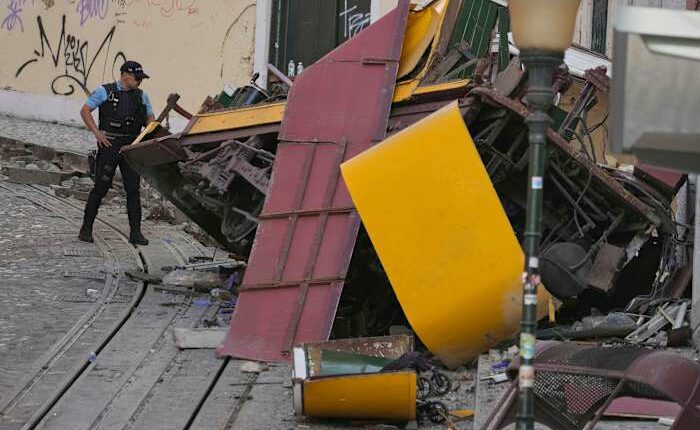Share this @internewscast.com

LISBON – The number of fatalities from the crash involving a popular Lisbon streetcar, well-known among tourists, increased to 17 on Thursday, following the deaths of two individuals out of the 23 who were injured, according to an official from emergency services.
The victims were all adults, as reported by Margarida Castro Martins, the head of Lisbon’s Civil Protection Agency. She refrained from sharing their identities or nationalities, stating that their families would be notified first.
There were 21 additional injuries from the crash on Wednesday, Castro Martins said. Among the injured were Portuguese nationals, along with two individuals from Germany, two from Spain, and one each from France, Italy, Switzerland, Canada, Morocco, South Korea, and Cape Verde, she added.
The variety of nationalities highlights the attraction’s popularity among tourists flocking to the Portuguese capital during the summer.
Portugal observed a national day of mourning Thursday after the capital’s worst disaster in recent history.
Authorities have not disclosed specific details regarding the deceased, but SITRA, the transport workers’ trade union, confirmed that André Marques, the streetcar’s brakeman, was among those who died.
This 19th-century streetcar is a major tourist attraction in Lisbon, typically filled with travelers at this time of the year for its brief, scenic journey up and down one of the city’s steep hills.
Teams of pathologists at the National Forensics Institute, reinforced by colleagues from three other Portuguese cities, worked through the night on autopsies, officials said. The injured were admitted to several hospitals in the Lisbon region.
The streetcar’s crumpled wreckage was still on the downtown road where it crashed Thursday, cordoned off by police.
Detectives from Portugal’s judicial police force, which investigates serious incidents, photographed the rails and the wreckage on the deserted road.
Officials declined to speculate on whether a faulty brake or a snapped cable may have caused the derailment.
The yellow-and-white streetcar, known as Elevador da Gloria, was lying on its side on the narrow road that it travels on, its sides and top crumpled. It crashed into a building where the road bends, leaving parts of the mostly metal vehicle crushed.
“It hit the building with brutal force and fell apart like a cardboard box,” witness Teresa d’Avó told Portuguese television channel SIC. She described the streetcar as out of control and seeming to have no brakes, and said she watched passersby run into the middle of the nearby Avenida da Liberdade, or Freedom Avenue, the city’s main thoroughfare.
The crash occurred at the start of the evening rush hour, around 6 p.m. local time. Emergency officials said all victims were pulled out of the wreckage in just over two hours.
The streetcar, technically called a funicular, is harnessed by steel cables and can carry more than 40 people, seated and standing. It is also commonly used by Lisbon residents.
The service, inaugurated in 1885, goes up and down a few hundred meters of a hill on a curved, traffic-free road in tandem with one going the opposite way. It goes between between Restauradores Square and the Bairro Alto neighborhood renowned for its nightlife.
Lisbon’s City Council halted operations of three other famous funicular streetcars in the city while immediate inspections were carried out.
The Elevador da Gloria is classified as a national monument.
Lisbon hosted around 8.5 million tourists last year, and long lines of people typically form for the brief rides on the popular streetcar.
Carris, the company that operates the streetcar, said that scheduled maintenance had been carried out. It offered its deepest condolences to the victims and their families in a social media post, and promised that all due diligence would be taken in finding the causes.
President Marcelo Rebelo de Sousa offered his condolences to affected families, and Lisbon Mayor Carlos Moedas said the city was in mourning. “It’s a tragedy of the like we’ve never seen,” Moedas said.
Portugal’s government announced that a day of national mourning would be observed Thursday.
“A tragic accident … caused the irreparable loss of human life, which left in mourning their families and dismayed the whole country,” it said in a statement.
European Union flags at the European Parliament and European Commission in Brussels flew at half-staff. Multiple EU leaders expressed their condolences on social media.
Copyright 2025 The Associated Press. All rights reserved. This material may not be published, broadcast, rewritten or redistributed without permission.











